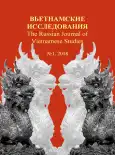Vietnam’s higher education amid the forthcoming Fourth industrial revolution
- 作者: Kanaev E.A.1,2, Darnell R.1, Dinh L.H.1
-
隶属关系:
- National Research University Higher School of Economics
- Primakov National Research Institute of World Economy and International Relations
- 期: 卷 2, 编号 1 (2018)
- 页面: 69-104
- 栏目: Articles
- URL: https://journal-vniispk.ru/2618-9453/article/view/84216
- ID: 84216
如何引用文章
详细
作者简介
Evgeny Kanaev
National Research University Higher School of Economics; Primakov National Research Institute of World Economy and International Relations
Email: ekanaev@hse.ru
Doctor of Sciences (History), Professor, School of International Affairs, Faculty of World Economy and International Affairs, National Research University Higher School of Economics. Leading researcher, Center for Asia-Pacific Studies, Primakov National Research Institute of World Economy and International Relations
Rebecca Darnell
National Research University Higher School of Economics
Email: rd3154a@student.american.edu
Graduate student, European and Asian Studies program at the National Research University Higher School of Economics, Teaching assistant, Higher School of Economics-New Economic School Joint Bachelor’s Program
Le Dinh
National Research University Higher School of Economics
Email: giangdinh@yandex.ru
Graduate student, European and Asian Studies program at the National Research University Higher School of Economics
参考
- Alibaba Founder Jack Ma: AI Will Cause People ‘More Pain Than Happiness’. The Guardian. Retrieved on December 30, 2017 from URL: https://www.theguardian.com/technology/2017/apr/24/alibaba-jack-maartificial-intelligence-more-pain-than-happiness
- Bamber P., Brun L., Frederick S., Gereffi G. (2017). Chapter 1: Global Value Chains and Economic Development. Duke Global Value Chains Center, pp. 1-17. Retrieved on December 01, 2017 from URL: https://gvcc.duke.edu/wp-content/uploads/Duke_KIET_GVS_Economic_Development_CH_1-2. pdf.
- BCG Perspectives (2013). 3D Printing Will Change the Game. Retrieved on November 26, 2017 from URL: https://www.bcgperspectives.com/content/articles/nformation_technology_strategy_innovation_prepare_impact_3D_printing_change_game/
- Data of the official website of Hanoi National University of Education. Retrieved on December 08, 2017 from URL: http://english.hnue.edu.vn/
- Ho Chi Minh National Academy of Politics (2017). International Integration and Its Impact on Party Building in Vietnam. Retrieved on December 01, 2017 from URL: http://english.hcma.vn/home/features/international-integration-and-its-impacts-on-party-building-in-vietnam-140
- Huynh Phu, Arana R.D. (2016). ASEAN in Transformation: How Technology is Changing Jobs and Enterprises. International Labor Organization. 4 pp. Retrieved on December 15, 2017 from URL: http://www.ilo.org/wcmsp5/groups/public/---asia/---ro-bangkok/---ilohanoi/documents/publication/wcms_537822.pdf
- International Telecommunications Union (2016). Percentage of Individuals using the Internet. Retrieved on November 10, 2017 from URL: https://www.itu.int/en/ITU-D/Statistics/Pages/stat/default.aspx
- Le Thi Kim Anh, Hayden M. (2017). The Road Ahead for the Higher Education Sector in Vietnam. Journal of International and Comparative Education. Vol. 6, Issue 2, pp. 77-89. Retrieved on December 18, 2017 from URL: http://ajba.um.edu.my/index.php/JICE/article/download/7721/5480
- Luật Giáo dục Đại học (2012) [Law on Higher Education]. Government Portal. Retrieved on November 05, 2017 from URL: http://www.chinhphu.vn/portal/page/portal/chinhphu/hethongvanban?mode=detail&document_id= 163054.
- Mở và miễn phí xu hướng học tập mới [The Open and Free Course: A New Educational Trend] (2016). Thanh niên. Retrieved on 19 December 2017 from URL: https://thanhnien.vn/giao-duc/mo-va-mien-phi-xu-huong-hoctap-moi-653332.html.
- Natural Disaster Could Cost Vietnam $6.7 Billion (2016). Vietnam News. Retrieved on December 16, 2017 from URL: http://vietnamnews.vn/society/346294/natural-disasters-could-cost-vn-67b.html
- Nguyen Hong Minh (2016). Industrial Revolution 4.0 and the Given Issues to Professional Education System in Vietnam. Ministry of Labor-Invalids and Social Affairs. Retrieved on 18 December 2017 from URL: http://en.tcdn.gov.vn/infomation/research-exchange/2016/12/155.aspx
- Nguyễn Minh Thuyết (2014). Tự chủ đại học - thực trạng và giải pháp [University Autonomy - Status and Solutions]. Tạp chí Tia sáng. Retrieved on December 20, 2017 from URL: http://tiasang.com.vn/-giao-duc/tu-chudai-hoc-thuc-trang-va-giai-phap-7739
- Những con số "biết nói" về giáo dục đại học Việt Nam [The Statistics on Vietnam’s Higher Education] (2017). Vietnamnet. Retrieved on December 30, 2017 from URL: http://vietnamnet.vn/vn/giao-duc/tuyen-sinh/nhungcon-so-biet-noi-ve-giao-duc-dai-hoc-viet-nam-389870.html
- Overall strategy for international integration through 2020, vision to 2030 (2016). Online Newspaper of the Government. Retrieved on December 11, 2017 from URL: http://news.chinhphu.vn/Home/Overall-strategy-for-international-integration-through-2020-vision-to-2030/20161/29060.vgp
- Oxford Business Group (2017). Vietnam’s IT Industry Sees High Growth Rates, Although Education and Training Challenges Remain. Retrieved on November 28, 2017 from URL: https://oxfordbusinessgroup.com/overview/moving-toward-maturity-industry-seeing-high-growth-rates-although-some-challenges-such-education-and.
- Phát triển doanh nghiệp nhỏ và vừa - tạo động lực cho nền kinh tế [Developing Small and Medium Enterprises as a Driving Force for the National Economy] (2016). Tạp chí Cộng sản. Retrieved on December 20, 2017 from URL: http://www.tapchicongsan.org.vn/Home/PrintStory.aspx? Distribution=42747&print=true
- Ryazantsev S., Kuznetsov N., Trịnh Duy Luân (2009). Di cư từ Việt Nam đến Liên bang Nga [The Migration from Vietnam to Russia]. Xã hội học [Sociology]. Vol. 2, pp. 31-40.
- Schwab K. (2015). The Fourth Industrial Revolution. Foreign Affairs. Retrieved on December 12, 2017 from URL: https://www.foreignaffairs.com/articles/2015-12-12/fourth-industrial-revolution.
- SCImago Journal and Country Rank (2016). Retrieved on December 18, 2017 from URL: http://www.scimagojr.com/countryrank.php?year=2016
- Sheridan G. (2010) Viet Nam: Preparing the Higher Education Sector Developmental Project (HESDP). Vietnam Higher Education Sector Analysis. Asian Development Bank. 48 pp. Retrieved on November 25, 2017 from URL: https://www.adb.org/sites/default/files/project-document/63092/ 42079-01-vie-tacr-03.pdf
- Speedtest Global Index (2017). Retrieved on November 11, 2017 from URL: http://www.speedtest.net/global-index#fixed
- The Asian-Oceanian Computing Industry Organization (2017). Reimagining the Digital Era: Digital Transformation Agendas & Initiatives within the Asia Pacific Economies. 212 pp. Retrieved on November 30, 2017 from URL:https://witsa.org/wp-content/uploads/2017/08/ASOCIO_Consolidated_24Aug17_Finalrevised.pdf.
补充文件







